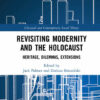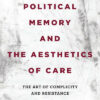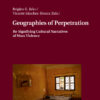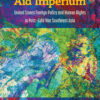Books

Revisiting Modernity and the Holocaust: Heritage, Dilemmas, Extensions
Edited by Jack Palmer and Dariusz Brzeziński. Zygmunt Bauman’s Modernity and the Holocaust is a decisive text of intellectual reflection after Auschwitz, in which Bauman rejected the idea that the Holocaust represented the polar opposite of modernity and saw it instead as its dark potentiality. Bringing together leading scholars from across disciplines, this volume offers the…
Read more
Political Memory and the Aesthetics of Care: The Art of Complicity and Resistance
By Mihaela Mihai. With this nuanced and interdisciplinary work, political theorist Mihaela Mihai tackles several interrelated questions: How do societies remember histories of systemic violence? Who is excluded from such histories’ cast of characters? And what are the political costs of selective remembering in the present? Building on insights from political theory, social epistemology, and…
Read more
Sin Sick: Moral Injury in War and Literature
By Joshua Pederson. In Sin Sick, Joshua Pederson draws on the latest research about identifying and treating the pain of perpetration to advance and deploy a literary theory of moral injury that addresses fictional representations of the mental anguish of those who have injured or killed others. Pederson’s work foregrounds moral injury, a recent psychological concept distinct from…
Read more
Picturing Genocide in the Independent State of Croatia: Atrocity Images and the Contested Memory of the Second World War in the Balkans
Jovan Byford. Picturing Genocide in the Independent State of Croatia examines the role atrocity photographs played, and continue to play, in shaping the public memory of the Second World War in the countries of the former Yugoslavia. Focusing on visual representations of one of the most controversial and politically divisive episodes of the war — genocidal…
Read more
Ideology and Mass Killing: The Radicalized Security Politics of Genocides and Deadly Atrocities
By Jonathan Leader Maynard. In research on ‘mass killings’ such as genocides and campaigns of state terror, the role of ideology is hotly debated. For some scholars, ideologies are crucial in providing the extremist goals and hatreds that motivate ideologically committed people to kill. But many other scholars are sceptical: contending that perpetrators of mass…
Read more
The Oxford Handbook on Atrocity Crimes
Edited by Barbora Holá, Hollie Nyseth Nzitatira, and Maartje Weerdesteijn. Social scientific research focusing on mass atrocities, which include widespread or systematic crimes such as genocide, crimes against humanity, and war crimes, expanded after the end of the Cold War. Mass violence in the former Yugoslavia, as well as the genocide in Rwanda, sparked new research initiatives in…
Read more
Geographies of Perpetration: Re-Signifying Cultural Narratives of Mass Violence
By Brigitte E. Jirku and Vicente Sánchez-Biosca. This volume maps cultural representations of Mass Violence from the perpetrators’ perspective. It analyzes spaces where political crimes have been committed and how these places have undergone successive resemanticization in collective memories. The chapters comparatively examine scenes of Mass Violence carried out in very diverse regions of the…
Read more
Aid Imperium: United States Foreign Policy and Human Rights in Post-Cold War Southeast Asia
By Salvador Santino F. Regilme Jr. Does foreign aid promote human rights? As the world’s largest aid donor, the United States has provided foreign assistance to more than 200 countries. Deploying global numerical data on US foreign aid and comparative historical analysis of America’s post–Cold War foreign policies in Southeast Asia, Aid Imperiumprovides the most…
Read more
I You We Them: Revealing the ‘desk killers’, perpetrators of crimes against humanity
By Dan Gretton. Vast and revelatory, Dan Gretton’s I You We Them is an unprecedented study of the perpetrators of crimes against humanity: the ‘desk killers’ who ordered and directed some of the worst atrocities of the modern era. From Albert Speer’s complicity in Nazi barbarism to cases of ecocide and the deaths of activists, Gretton shines…
Read more
Show Time: The Logic and Power of Violent Display
By Lee Ann Fujii. In Show Time, Lee Ann Fujii asks why some perpetrators of political violence, from lynch mobs to genocidal killers, display their acts of violence so publicly and extravagantly. Closely examining three horrific and extreme episodes—the murder of a prominent Tutsi family amidst the genocide in Rwanda, the execution of Muslim men in a…
Read more
